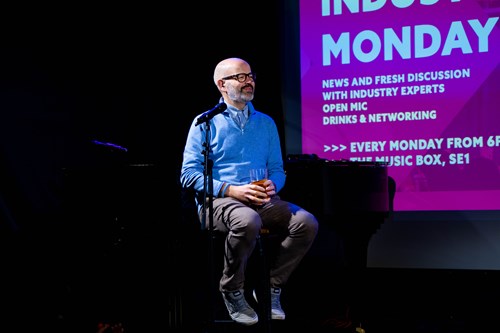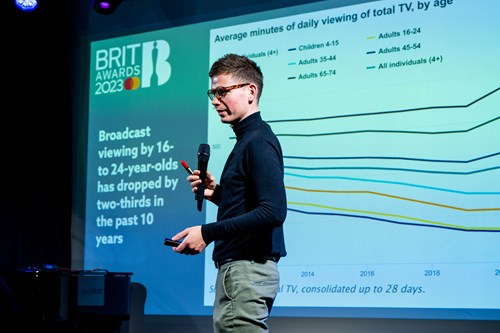Are the BRIT Awards on the road to irrelevancy? It’s a tough question to ask since they’ve been going strong since 1977, but as more of us find ourselves glued to portrait-orientated entertainment on our phones and it could be the case that people just don’t care anymore.
For one of our Music Industry Mondays events, Artist Manager, JD, welcomed our guest, LCCM Anthony Hamer-Hodges for a conversation on the relevancy of the BRIT Awards today. After a series of votes from the future leaders of the music industry (otherwise known as our lovely students), we arrived at interesting conclusions.

Are the BRITs inclusive?
After years of controversy and complaints about the level of inclusivity at the BRIT Awards, things were finally looking up with the introduction of a gender-neutral Artist of the Year category for 2023, but our hopes were quickly when only male-identifying artists were nominated.
Music Journalist, Jess Partridge, editor of the blog London Stereo, said it best by tweeting: “You know what, I was really optimistic with last years Brit awards, that their inclusive gender neutral categories would be a positive change. Well done for crushing that optimism. Appalling you couldn’t find anyone other than men to nominate for best artist. Do better.”
Ouch.
As well as women (yet again) struggling to get a seat at the table, there are also a ton of deserving artists who never really get a look in either. In order to qualify to be longlisted for a BRIT award, you’d need to have a top 40 single or album during a certain period of time. So if you were a cool underground artist who was really gaining some traction, and you didn’t make the top 40, too bad.

Are people still watching the BRITs?
One of the most obvious ways to tell if something is still relevant is probably by its viewership. Most award shows, as well as the BRITs, have seen a notable decline in their viewership with the BRITs losing 200,000 viewers between 2021 and 2022.
Is this because people don’t really watch TV anymore, or are we all tired of seeing the same white guys win the same awards?
This year, however, the BRITs managed to pull in 3.3 million viewers, the first increase in viewership since 2016. Maybe people’s attention spans aren’t as doomed as we thought.
With the rise of social media, especially TikTok, you don’t even need to watch the BRITs live on TV to find out if your favourite artist got snubbed. Most people skip the two and half-hour ordeal and just flick through their Twitter or TikTok feeds in the morning to find out who won what.
Are the BRIT awards still relevant, then?
Considering everything we’ve discussed, if someone you knew won a BRIT award, you’d be pretty amazed (jealous even, it’s okay to admit it) which means the award must still hold some significance. Winning an award from the biggest celebration of music in the UK? That’s a big deal whether people are watching it or not.
Despite the controversy (and possible corruption), the BRIT awards are one of the biggest global music events and winning one is still an incredible achievement for artists around the world. It’s not just a night of entertainment for audience members, and the screaming Brit school students in the front row, it’s a night of celebration for artists, production teams and all the BTS crew who were involved in making the very music we celebrate every year.
These events have their issues, there’s no question about that, but irrelevant? Perhaps not.
What do you think? Have a watch of the full discussion here or have your say in person and join us for the next one! You can grab a ticket here.


